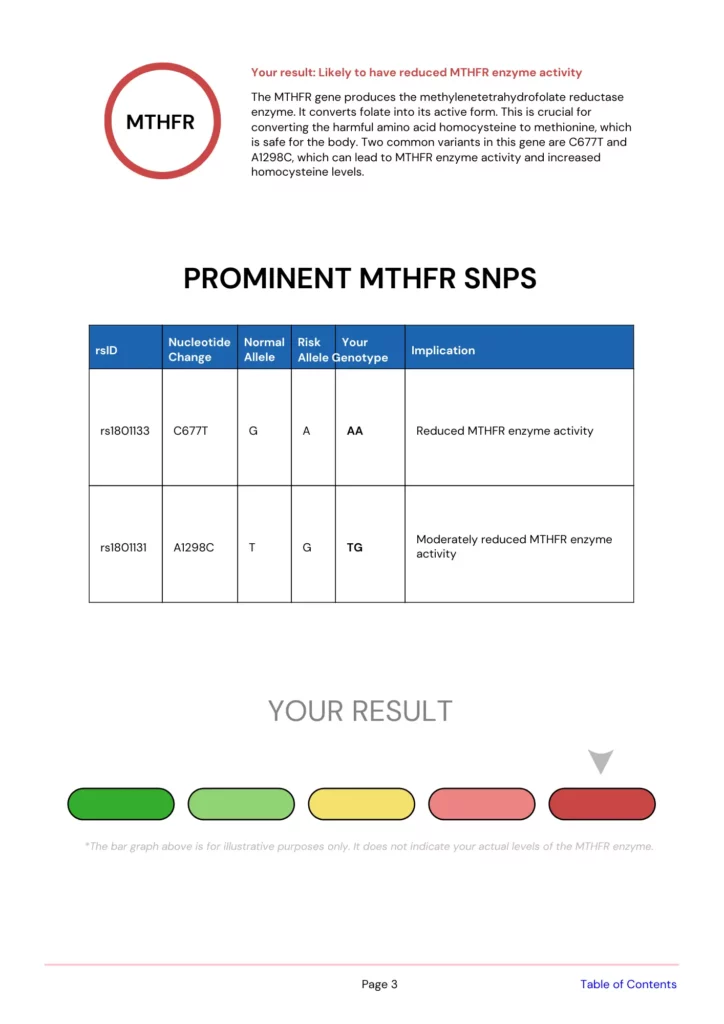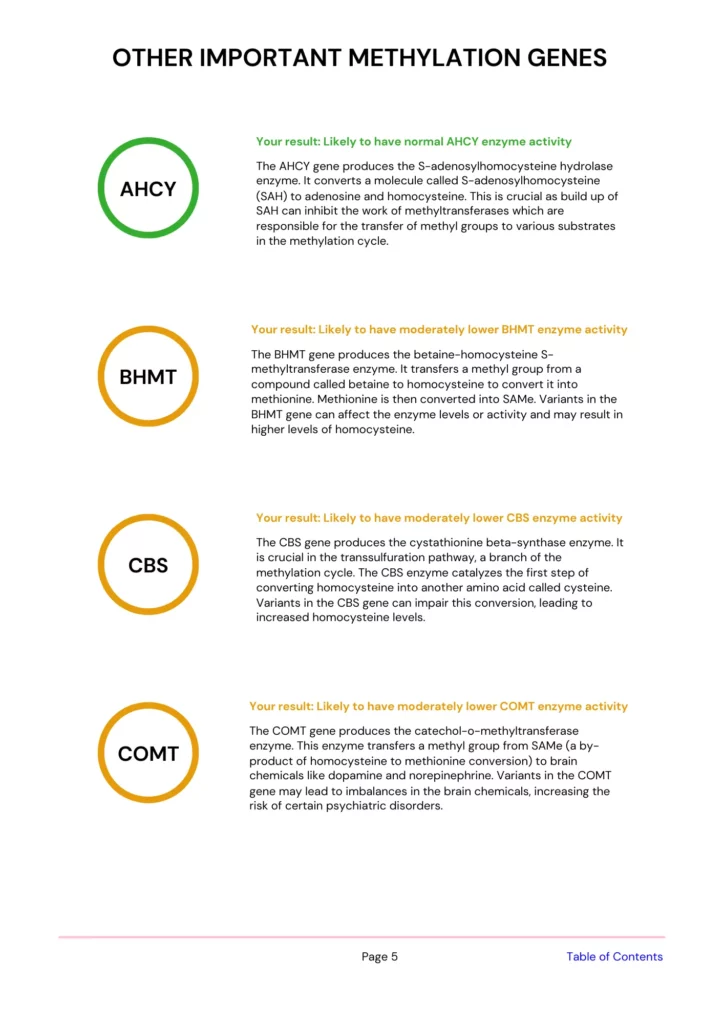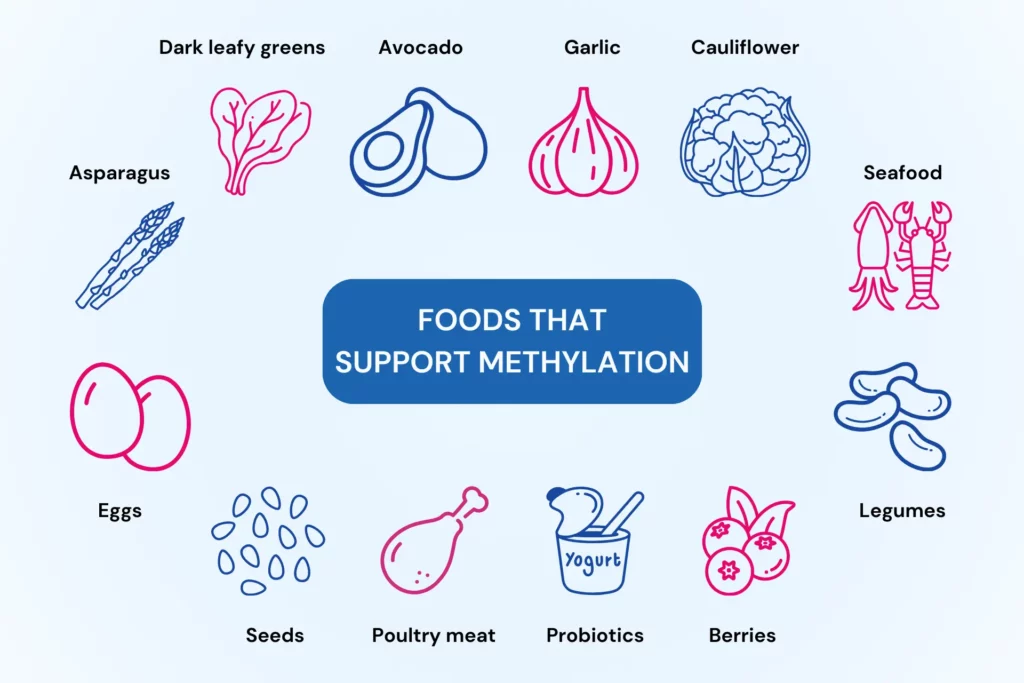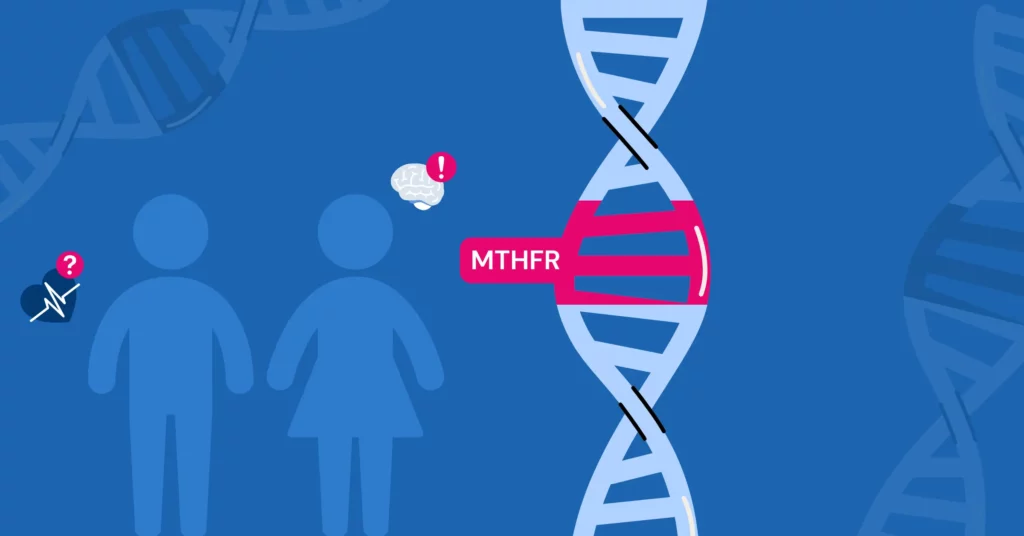The study of genetics and epigenetics helps us understand the complex factors influencing an organism’s health and development. Genetic studies focus on inherited traits, while epigenetics looks at how lifestyle, diet, and stress affect gene expression without altering the DNA sequence. This distinction highlights the dynamic relationship between nature (genetics) and nurture (environment), emphasizing that both play crucial roles in shaping health outcomes. One gene of interest in this context is MTHFR (methylenetetrahydrofolate reductase). It’s a gene involved in the methylation process, a key aspect of epigenetics. Keep reading to explore how environmental and lifestyle factors affect gene function and contribute to changes in methylation.
Genetics vs. Epigenetics
Genetics refers to the study of genes and how they influence the traits and characteristics of an organism.
Genes are inherited from parents and provide the blueprint for various biological functions.
Unlike genetics, epigenetics focuses on gene activity changes without altering the DNA sequence.
Epigenetics shows that an organism's environment can influence gene expression, sometimes overriding genetic predispositions.
For example, studies have shown that even mice with genetic predispositions to certain diseases can have healthy offspring if raised in a good environment.
Is MTHFR Epigenetic?
MTHFR, or methylenetetrahydrofolate reductase, is a gene that plays a crucial role in processing folate (vitamin B9) and regulating homocysteine levels in the body.
This gene can be influenced by epigenetic factors, which are changes that affect gene activity without altering the DNA sequence itself.
MTHFR Methylation
Methylation is a common epigenetic change that acts like a switch.
It turns a gene 'off' when its functioning is not required.
MTHFR is a vital enzyme in the methylation cycle. It is responsible for converting folate into its active form, 5-MTHF.
This active folate helps convert homocysteine into methionine, a protein-building block.
In some cases, the MTHFR gene can become over-methylated due to mutations, reducing its expression and lowering enzyme activity.
MTHFR Hypermethylation
MTHFR hypermethylation occurs when excess methyl groups attach to the MTHFR gene's promoter region, reducing its activity and the production of the MTHFR enzyme.
This reduction can disrupt essential processes and lead to several health issues, including:
- Congenital heart defects, particularly in specific populations
- Neurological disorders, including Down syndrome
- Diabetic retinopathy and diabetes-related complications
- Diabetes: Studies found that individuals with diabetic retinopathy (eye damage from diabetes) had more frequent hypermethylation (excessive methylation) of the MTHFR gene. This hypermethylated profile was linked to higher levels of bad cholesterol (LDL). In people with diabetic nephropathy (kidney damage), hypermethylation was linked to elevated levels of specific proteins and antioxidants.
- Alzheimer's disease: Epigenetic changes in the MTHFR gene are also associated with Alzheimer's disease, especially in older adults. The MTHFR gene helps produce SAM, which is essential for DNA methylation. Changes in this process can contribute to disease.
- Cancer: Epigenetic changes, including methylation, are common in many types of cancer. For example, in IDH-mutant glioma (a type of brain cancer), alterations in DNA methylation can activate oncogenes like PDGFRA, contributing to its development.
Xcode Life Methylation Genetic Test – What Is It?
The Xcode Life Methylation Genetic Test utilizes raw data obtained from popular ancestry genetic testing service providers like 23andMe, Ancestry DNA, Family Tree DNA (FTDNA), Living DNA, and My Heritage to provide the MTHFR and Methylation report.
The test analyzes more than 15 genes associated with the methylation pathway, including MTHFR, MTRR, MTR, COMT, and AHCY.



For a sample MTHFR report/ preview of the report, click here.
What Is The Best Diet For MTHFR Epigenetics?
Maintaining proper MTHFR methylation and epigenetic balance starts with smart dietary and supplement decisions.
Explore the foods and supplements highlighted below to support these goals.

What Foods Increase MTHFR Methylation?
Dr. Josh Axe, a chiropractor and clinical nutritionist, states that certain lifestyle habits can help support normal MTHFR methylation, regardless of individual genetic factors.
These habits include consuming nutrient-rich foods such as folate, B vitamins, magnesium, and zinc.
Some of the best foods to support methylation include:
- Dark leafy greens
- Asparagus
- Avocado
- Garlic and onions
- Cruciferous vegetables (e.g., broccoli, cauliflower, kale)
- Fish and seafood
- Eggs
- Beans and legumes
- Nuts (e.g., almonds, walnuts)
- Seeds (e.g., sunflower, pumpkin seeds)
- Grass-fed meats and poultry
- Probiotic foods (supporting gut health for better nutrient absorption)
- High-antioxidant foods (e.g., berries, citrus fruits, turmeric)
Supplements For Epigenetic Modifications
Specific supplements may help facilitate healthy epigenetic modifications like methylation. These supplements often contain:
- Folate (especially 5-MTHF or folinic acid)
- Vitamin B12 (methylcobalamin)
- Betaine (TMG)
- Choline
- Other B vitamins (B6, B2)
- SAMe
Other compounds, such as curcumin (from turmeric), green tea extract, sulforaphane, and resveratrol, are also studied for their potential epigenetic effects.
Note: Always consult a healthcare provider first to ensure the chosen supplements are appropriate for your health.
FAQs About MTHFR And Epigenetics
Is Methylation A Form Of Epigenetics?
Yes, methylation is a form of epigenetics. It acts as a molecular switch, attaching a methyl group to DNA and thus regulating gene activity by turning genes on or off without changing the DNA sequence.
This control is essential to numerous biological functions, including disease development.
What Diseases Are Caused By Epigenetics?
Epigenetic changes can alter gene expression and contribute to the development of various diseases.
Some of the diseases influenced by epigenetic factors include:
- Cancer: Epigenetic modifications can disrupt normal cell growth and division, leading to cancer.
- Diabetes: Changes in gene expression due to epigenetics can increase the risk of developing diabetes.
- Lupus: Epigenetic alterations contribute to immune dysfunction in lupus.
- Asthma: Early-life epigenetic changes can affect the immune system, raising the risk and severity of asthma later in life.
- Neurological disorders: Epigenetic changes occur in conditions such as Rett syndrome, Alzheimer's, Parkinson's, and Huntington's. For instance, Rett syndrome is linked to MeCP2 gene mutations, while Huntington's disease involves histone modifications, which affect DNA-organizing proteins.
- Developmental disorders: Epigenetic disruptions are associated with X-linked, Rubinstein-Taybi, and Coffin-Lowry syndromes and may also impact the expression of genetic disorders like α-thalassemia.
Can Epigenetic Changes Be Reversed?
As demonstrated in a recent clinical trial, epigenetic changes are reversible.
The study involved 43 healthy adult males aged 50-72 participating in an 8-week treatment program.
This program included guidance on diet, sleep, exercise, relaxation, and the use of supplemental probiotics and phytonutrients. The control group did not receive any intervention.
The researchers measured epigenetic aging using a method called the Horvath DNAmAge clock.
The results showed that the treatment group had a 3.23-year decrease in epigenetic age compared to the control group.
Within the treatment group, their epigenetic age decreased by 1.96 years on average during the program.
Additionally, there were improvements in blood markers, such as a 15% increase in a nutrient called 5-methyltetrahydrofolate and a 25% decrease in triglycerides.
While this study suggests lifestyle changes may reverse epigenetic alterations, further research can confirm its claim.
Summary: Is MTHFR Epigenetic?
- The MTHFR gene is not an epigenetic factor but plays a crucial role in the epigenetic process of DNA methylation.
- MTHFR gene polymorphisms can affect folate metabolism and homocysteine levels, potentially leading to health issues such as heart disease, stroke, and congenital disabilities.
- Excessive methylation on the MTHFR gene can reduce its activity, a phenomenon known as hypermethylation, which can slow down its function.
- Nutrients like folate and B vitamins are essential for proper methylation and are vital in supporting methylation reactions.
- Lifestyle changes, including a balanced diet and supplements, may help reverse specific epigenetic changes, offering potential health benefits.
Expert-recommended Picks

What Is The Best Multivitamin For MTHFR Mutation?

MTHFR Mutations: Myths vs. Facts

MTHFR Symptoms in Children: Genetic Mutations and Health Impacts
References
https://pmc.ncbi.nlm.nih.gov/articles/PMC3193653
https://dmsjournal.biomedcentral.com/articles/10.1186/s13098-017-0284-3
https://pmc.ncbi.nlm.nih.gov/articles/PMC6359124
https://pmc.ncbi.nlm.nih.gov/articles/PMC5735284
https://pmc.ncbi.nlm.nih.gov/articles/PMC8339558
https://www.sciencedirect.com/science/article/abs/pii/S1751499110000417
https://www.mdpi.com/2072-6643/16/5/678
https://pmc.ncbi.nlm.nih.gov/articles/PMC7750768
https://pmc.ncbi.nlm.nih.gov/articles/PMC8327151
https://www.sciencedirect.com/science/article/pii/S0925443916303246




